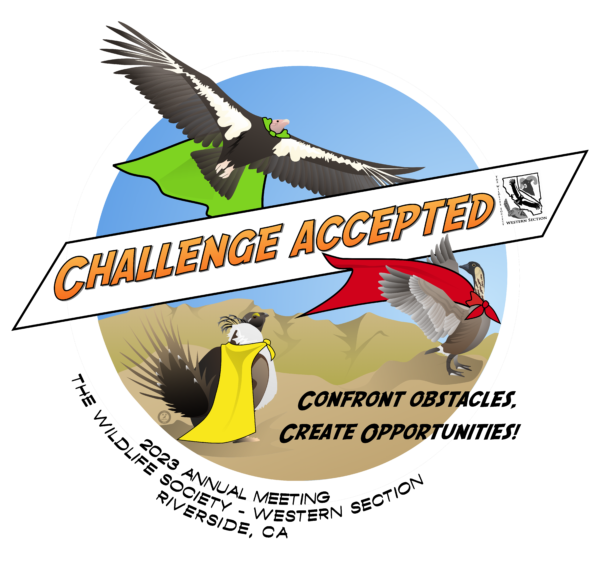Call for Papers
The deadline for submission of both Oral Presentation and Poster abstracts was Friday, October 25, 2019. Late abstracts may be submitted at this time and they will be added to a waiting list to fill cancellations and gaps.
Please submit abstracts electronically by filling out the interactive form on the Section website at: http://wildlifeprofessional.org/western/ac2020_abstract_submit.php

We are soliciting abstracts for posters and 20-minute oral presentations for the concurrent technical and poster sessions. Abstract content should be related to technical session topics listed below, but additional topics may be entertained if sufficient presentations are submitted. The conference program and session chairs will evaluate submitted abstracts to determine final concurrent session topics. All papers associated with the oral concurrent sessions will be presented Tuesday afternoon through Friday afternoon, February 4 to February 7, 2020. In general, presenters should expect to speak for no more than 17 minutes, allowing for an introduction and limited Q&A after each presentation.

A poster session and reception will be held on Thursday, February 6, 2020. Poster presenters are asked to be available at their poster during the poster session to discuss their work with interested viewers. Posters should be set up on Wednesday between 2-4pm. They will be available for viewing Wednesday afternoon through the Thursday evening poster reception. Posters should be no more than 3\’ tall by 4\’ wide. Display boards will be provided. Posters should be removed on Thursday evening by 9pm.
Concurrent Technical Session topics may include, but are not limited to:
- Conservation Planning and Environmental Offsets
- Ecology and Conservation of Amphibians and Reptiles
- Ecology and Conservation of Birds
- Ecology and Conservation of Mammals
- Ecology and Conservation of Invertebrates
- Endangered Species: Planning for Recovery
- Human Dimensions in Wildlife Conservation and Management
- Impacts to Lands and Wildlife from Recreation
- Inputs and Methods for Conservation Planning & Ways to Measure Success
- Multi-Benefit Projects
- Pacific Islands
- Public Policy and Wildlife Management
- Waterfowl
- Wildlife and Climate Change
- Wildlife and Forest Management and Policy
- Wildlife Conservation and Habitat Management in Lassen / Shasta Landscapes
- Wildlife Diseases and Pathology
- Wildlife, Pollution, and Ecotoxicology
- Wildlife and Renewable Energy
- Wildlife Professionals: Agency Coordination & Collaboration
- Wildlife Professionals: Consultant Case Studies
- Wildlife Responses to Fire and Post-Fire Restoration
- Wildlife Techniques and Technologies
- Other
Note: Session titles may be added or changed at a later date based on papers received. If a group has the desire and sufficient participants to create a unique session please contact the program chair (Kelly Holland, presidentelect@tws-west.org).
Check http://tws-west.org for an updated list of technical sessions and schedule.
Abstract Submission Process:
The deadline for submission of both Oral Presentation and Poster abstracts is Friday, October 25, 2019, FIRM.
Please submit abstracts electronically by filling out the interactive form on the Section website at: http://wildlifeprofessional.org/western/ac2020_abstract_submit.php
Abstracts should not exceed 200 words and must adhere to format and layout elements provided in the example below. Indicate whether the paper will be an oral presentation or a poster, and if an oral presentation, indicate your preferred session.
Oral and Poster Presenters are expected to pay the conference registration fee and cover their own travel and lodging expenses. See the Western Section website for registration and other conference information (coming soon).
We will review the submitted abstracts and will notify authors of their status by December 6, 2019. Thank you, in advance, for your time and effort in the submission process.
ABSTRACT EXAMPLE:
Preferred Session: Ecology and Management of Shorebirds
Type of paper: Oral presentation
If a student, indicate if you intend to participate in the Student Judging.
Paper Title: Status and Habitat Use of Long-Billed Curlews in the Central Valley in Fall
- David Shuford, PRBO Conservation Science, 3820 Cypress Drive #11, Petaluma, CA 94954, dshuford@prbo.org, (415) 868-0371×310; Co–authors: Gary W. Page; Gary M. Langham; and Catherine Hickey
Abstract: The long-billed curlew (Numenius americanus) – a large shorebird of conservation concern at the continental level – is a migrant and winter resident in California’s Central Valley, where it concentrates primarily in agricultural lands. Despite recent estimates of the size of the curlew’s North American breeding population, little is known about its abundance and habitat needs at migratory stopovers and wintering areas. To help fill these gaps, we coordinated three broad-scale surveys of curlews in the central and southern portions of the Central Valley in fall and winter in 2007-2008 and a more comprehensive survey of the entire Central Valley in August 2009. On the latter survey, we recorded 20,775 curlews in 197 flocks. In all years in autumn, the vast majority of curlews were found in irrigated croplands, primarily alfalfa and irrigated pastures, during this otherwise arid season. More frequent surveys at the local level in Solano County and more recent radio-telemetry studies indicate that some curlews shift their distribution from fall to winter. More work on fine-scale habitat preferences and movements in the Central Valley is needed to aid in the conservation of this at-risk shorebird.
